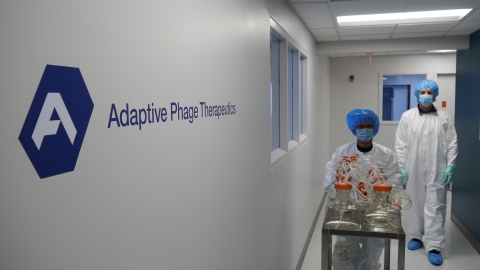GAITHERSBURG, Md.--(BUSINESS WIRE)--Adaptive Phage Therapeutics (APT), a clinical-stage biotechnology company dedicated to providing therapies to treat the global rise of multi-drug resistant infectious diseases, today announced the U.S. Food and Drug Administration (FDA) has granted the company orphan drug designation for the treatment of prosthetic joint infections (PJI) utilizing PhageBank™. APT’s PhageBank is a continually expanding phage library deployed with a companion diagnostic to achieve rapid response and cost-effective therapy for otherwise recalcitrant bacterial infections.
Orphan drug designation is given to drugs and biologics being developed to treat rare medical conditions, specifically those affecting fewer than 200,000 persons in the U.S. Orphan drug designation for the treatment of PJI utilizing PhageBank™ provides eligibility for seven years of U.S. market exclusivity upon FDA approval, a waiver from payment of marketing application User Fees, an exemption from performing clinical studies in pediatric patients, and tax credits that reduce the effective cost of progressing related clinical development.
“This orphan drug designation underscores the critical need for a new approach to treat multidrug resistant (MDR) bacterial infections, in this instance for the indication of prosthetic joint infections, our lead PhageBank™-based development program,” said Greg Merril, CEO and co-founder, Adaptive Phage Therapeutics. “In the short term, we are pleased to be in the final stages of initiating a Phase I/II clinical trial of PhageBank™ in PJI patients, to advance this potentially life-saving therapy to commercial approval, as expediently as possible. Long term, the PJI-PhageBank™ orphan drug designation will provide APT with additional incentives to continue progressing multiple PhageBank™-based therapies into clinical studies in the 2020-2021 period.”
APT is developing PhageBank™ for the treatment of PJI as well as a number of other serious unmet needs associated with MDR bacterial infections. PJI is a serious complication of joint replacement surgery, where infection can occur following implantation. It is estimated that approximately 0.5%-2.0% of knee prostheses and 0.3%-1.7% of hip prostheses become infected over the life of an implant. Surgical intervention in combination with antibiotics is the current standard of care for such infections, with annual cost to the U.S. healthcare system from PJIs estimated to be more than $1.6 billion.
APT is preparing to initiate a PJI-PhageBank™ Phase I/II clinical trial, a randomized, open-label, parallel-group, controlled study to evaluate the safety and surgery-sparing effect of PhageBank™ phage therapy in conjunction with antibiotics for patients with culture-proven chronic prosthetic joint infection who are candidates for two stage exchange arthroplasty. APT plans to initiate this trial at the Mayo Clinic in the fourth quarter of 2020, with an interim analysis currently projected to be available in the second quarter of 2021.
Adaptive Phage Therapeutics, Inc.
Adaptive Phage Therapeutics (APT) is a clinical-stage company founded to provide an effective therapeutic response to the global rise of multi-drug resistant (MDR) pathogenic bacteria. APT’s core asset is a large and continually expanding phage library, PhageBank™, deployed with a companion diagnostic to achieve rapid response and cost-effective therapy for otherwise recalcitrant bacterial infections. The technology was originally developed by the biodefense program of U.S. Department of Defense. APT acquired the world-wide exclusive commercial rights in 2017. Under the FDA emergency Investigational New Drug allowance, APT has provided investigational PhageBank therapy to treat more than 30 critically ill patients in which standard-of-care antibiotics had failed. For more information, visit http://www.aphage.com.

